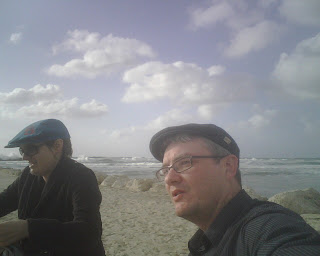Justice?
It is always a pleasure
to encounter “Torah’s Greatest Hits.” You know them: “You shall love your neighbour
as yourself,” “You shall have no other gods before me,” “Go forth from the land
of your ancestors,” and so many others that feel like the motherhood and apple
pie of our tradition such as this week’s, “Justice, Justice shall you pursue.”
The Greatest Hits give us
the multiple pleasures of instant recognition (I know that verse in Torah!) and
tribal satisfaction (look, that is something worth still repeating and contemplating
millennia later!) Yet the very familiarity that we have with such verses also
minimize the probability that we challenge ourselves on what the verses and
words mean, and even more importantly that we are willing to look at them
completely differently. Perhaps this is a great opportunity, as there are only
three, words, and two of them are repeated: “Tzedek, Tzedek tirdof.”
The first challenge is
actually the repeated word itself. “Tzedek
tirdof” would mean “You shall pursue justice,” but the repetition of the
word is an intensifier. Different attempts to express the intensification of
the thought include a simple direct translation: “Justice, justice shall you
pursue,” to the more classic, “Justice shall you surely pursue,” and “Justice
and only justice shall you pursue.” The double makes us sit up strait and pay
attention. “Listen, everyone, tzedek
is important and I am going to repeat it until we notice that there is
something to contemplate here.”
And hey, who doesn’t love
the word “justice?” Like mercy, love and holiness, “justice” pops out as good
and relevant. Would we rather be just or un-just? I will choose “just,” thank
you very much. But this is where we have to challenge the word itself. Tzedek doesn’t mean “justice” any more
than rachamim means “mercy,” ahavah means “love” and kodesh means “holy.” Tzedek means tzedek. With our “Greatest Hits,” part of the challenge is that we
move into a place of projecting the English translation onto the statement
without asking if the connotations of that word in our vernacular truly encompass
the subtleties of how tzedek was
understood by the writers of Deuteronomy between 2800 and 2400 years ago. If I
say, “we need to pursue justice!” from a soapbox in the town square and have a
crowd riled up to follow me, I could be talking about either “leave” or “remain”
as in this case “justice” is a matter of perspective and rhetoric rather than
reflective of some a priori
metaphysical ethical reality. But yet
both groups would absolutely claim their perspective to be the one pursuing
justice and the other side to be unjust. Is that the “tzedek” to which Torah refers?
Part of the problem is
there is really no such thing as translation in an objective sense, there is
only interpretation. We can never work with “a=b,” especially in more distantly
related language groups, as languages contain with them subjective cultural
baggage that renders “quite” in American English to mean “very” and “quite” in
British English to mean, “Not so much, but let me be polite.” How could we
forget George Bernard Shaw’s famous quote: “England and America are two countries
divided by a common language.” Kal v’chomer
(how much more so) a Germanic language with partial Romance vocabulary and a Semitic
language, and even more than that, with cultural concepts divided by more than two
millennia of societal evolution?
So, in the act of “translation”
we work with a semantic set rather than the assumption of absolute meaning, but
then must have the humility to admit that our choice of “b” if tzedek = “a” will come from our own
personal experiences, needs and biases. The semantic set for tzedek, for example, includes, “righteousness,
justice, virtue and equity.” Does our experience of “Tzedek, tzedek tirdof” change at all if we render it as, “You shall
surely pursue virtue?” How about, “Equity and only equity shall you pursue?”
The beauty of “Torah’s
Greatest Hits” is that we think we know them so well, that it is these verses
and phrases that can most transform us if we allow ourselves only a few moments
to step into dialogue with the complexity and multiplicity of our tradition. If
we lock a word to mean “justice” and we define “justice” solely as “that which represents
justice to me,” then we close ourselves off from what seems to be one of the
most consistent underlying purposes of Torah: to move us to constantly examine,
study, and reinvigorate our relationship with something we think we understand
by assuming there is always something more to learn. One could even say that
this is a virtue that we should surely pursue.

Comments